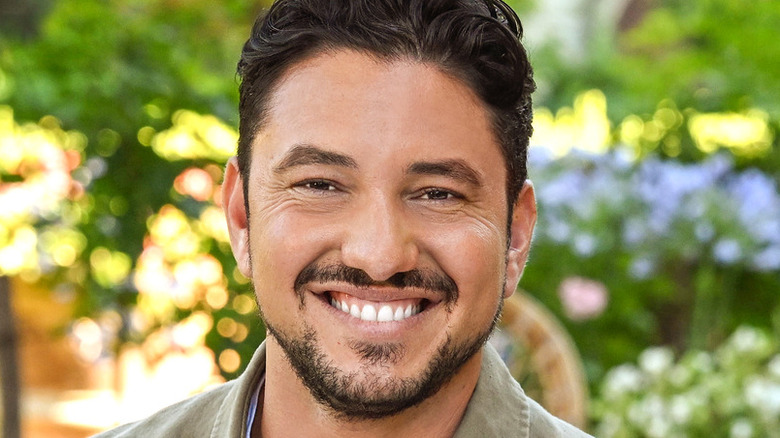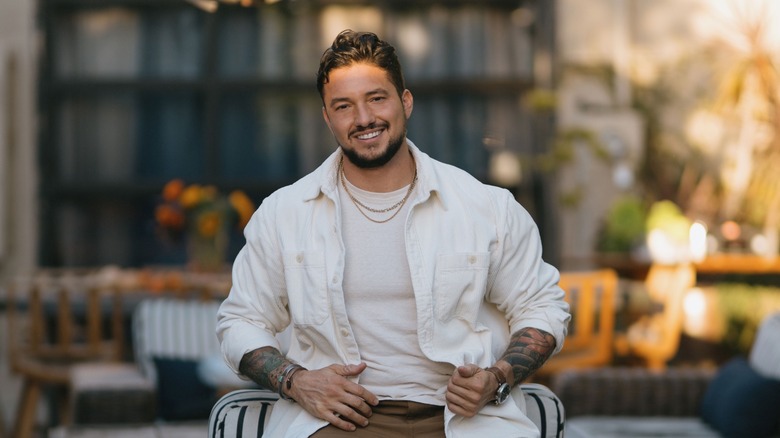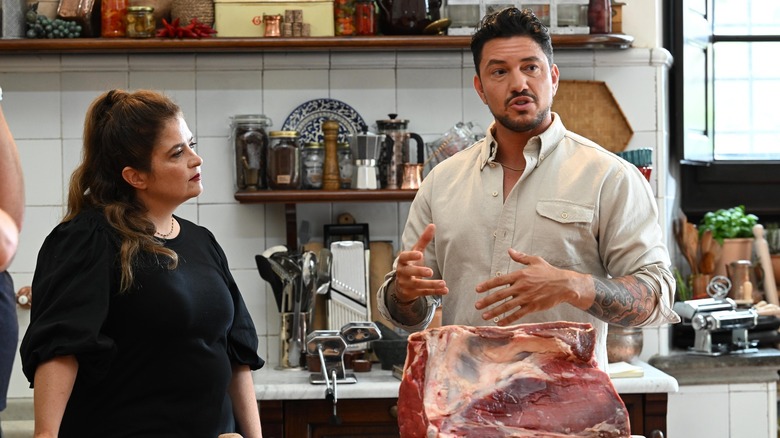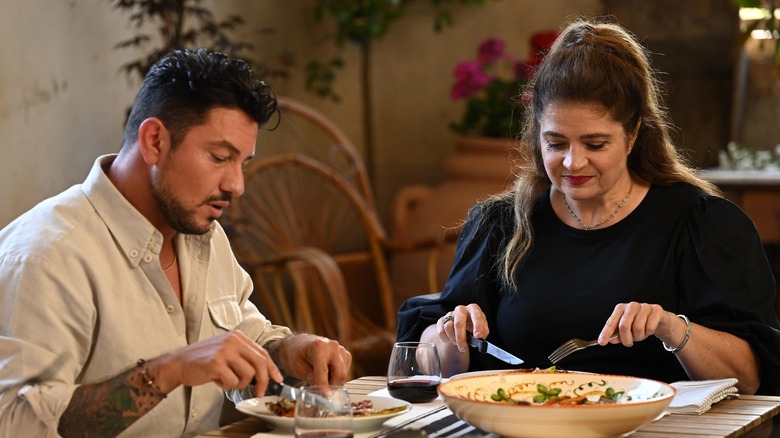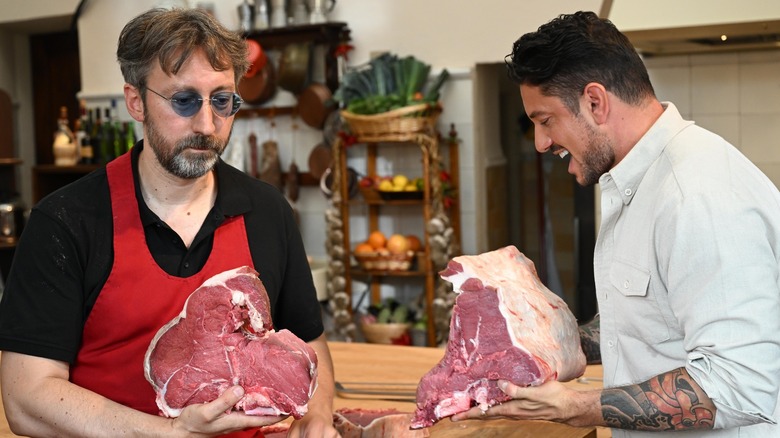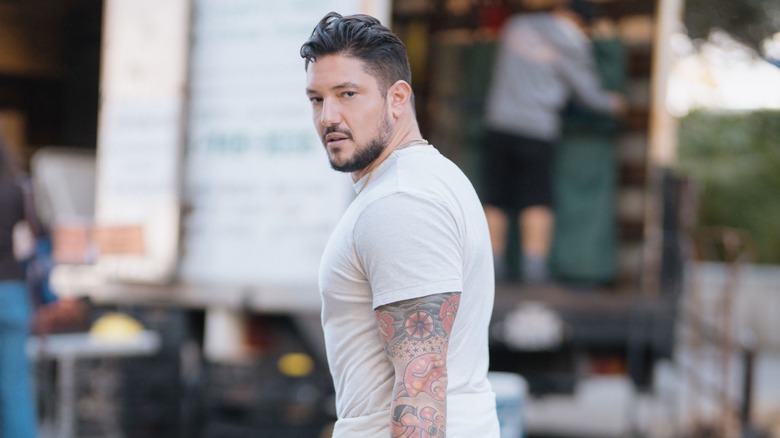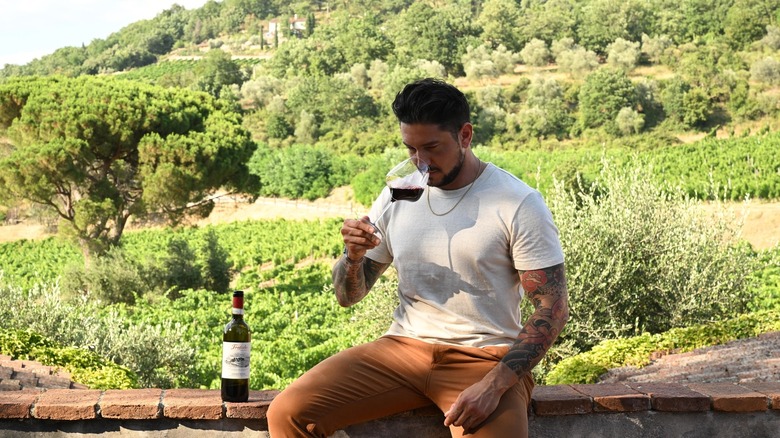What Gabe Bertaccini Loved, Hated, And Learned On Ciao House - Exclusive Interview
If you've caught Food Network's "Ciao House," then you already know that this is not your average Food Network cooking competition. The show places 10 chefs in a Tuscan villa, where they will then live and compete for a once-in-a-lifetime prize — the ultimate Italian cooking education, courtesy of some of the country's masters. As you could expect, drama ensues. Chefs are forced onto teams and, in some cases, are the ones deciding who stays each episode and who goes — making it necessary for contestants to walk a delicate balancing act of being nice enough that they're not sent packing but still shrewd enough that they come out ahead of the group.
At the helm of "Ciao House" are hosts and judges Alex Guarnaschelli and Gabriele Bertaccini. If you're a longtime Food Network fan, then you already know Guarnaschelli, but Bertaccini is a relative newcomer, with fewer TV credits to his name. However, Bertaccini quickly wins over audiences with his easy charm and enthusiastic passion for all things Italian and Tuscan cuisine. In an exclusive interview, Mashed spoke with Bertaccini to learn all about his experience filming "Ciao House," what it takes to win this cutthroat competition, and how to dip one's toe into the world of Tuscan cuisine at home.
A full lesson in Italian culture
Can you tell us a little bit about how you got involved with this show? What made you want to be a part of this project? What excites you about it?
What if you got a call that said, "Hey, would you like to go back home to Italy and bring 10 chefs and spend five weeks showing them why Italy is so great, and cook, and have amazing meals and some great wine and some truffles"? Would you have said no?
I was so excited. This is my jam. There are certain projects in life that happen exactly at the right moment, and "Ciao House" was that. When I got the call ... it felt so aligned. I am from Italy, but most specifically, I'm from Florence and Tuscany. It's such a special region. It was almost like a call saying, "Hey, spread the word about how beautiful and bountiful and special this place in Italy is."
Having the ability to bring good chefs [to Italy], spending time in the villa, and getting them to experience what Italian life and Italian food and cooking is made me extremely excited. It's a chef's job. It's what we do with our food.
For people who have not watched this show yet, why should they choose to watch "Ciao House"?
"Ciao House" is a journey in Italian culture and cuisine. This show could have never, ever been made in a studio. It had to be done on location, where this culture is not only learned but it's lived.
We say that to learn more about Italians, you have to understand Italian cuisine. You have to see them eating and cooking, because food, for us, is much more than what we do at lunch or dinner. It's an occasion for community. It's an occasion for sharing stories. It's an occasion for connecting with other people.
What's so special about "Ciao House" is that we go beyond the competition, which is extremely interesting. [It's] the dynamic of them working as a group, as a family, but also having to understand, "How am I going to play this game?"
We go into the land of Italian cuisine, the quintessential place where amazing cheese and fantastic artisans and amazing animals are raised, and the best produce in the world ... The time that we spend with the chefs and the artisans in the kitchen is what makes the show very special and not just another competition show. This is a full lesson in Italian culture.
How to be a judge on Ciao House
Since Tuscan cuisine is your specialty, does that make judging this competition easier or harder for you?
There are moments that are definitely, in my mind and in my heart, connected to specific memories of my family and my grandmother. I have an understanding of Italian cuisine and Italian food that goes beyond the technicality of it. It's full of memories and emotions — and sometimes eating specific dishes or using certain ingredients evoke a sense of belonging that's connected to a very personal memory. Sometimes, that makes it difficult to eat a dish or plate or an ingredient and separate my upbringing and what food means to me, my emotional connection, from the objectivity of the food.
But that's what great judges do. I was constantly eliminating — putting away — the emotional component of certain ingredients to see what the chefs created based on their understandings of Italian cuisine, based on the lessons and being surrounded by these amazing artisans creating Italian cuisine, learning from them, and seeing how they translate that into a plate.
That was extremely interesting, and that is what my judging is focused on — the idea of, can you respect the ingredient, but can you also show who you are in a dish? [Are you] able to manipulate a dish in a respectful way and then make the point of "This is who I am as a chef"?
There are some moments where your and Alex's feedback is a little harsh. Is it hard for you to be that critical, or do you feel like it's important for these chefs to get that honest feedback?
As chefs, we're very strong personalities, and we grow professionally in kitchens where nobody's sugarcoating how we cook. The kitchen itself is a place of honesty, sometimes brutal honesty. I never took my feedback in the kitchen ... as a personal attack.
When Alex and I are a little harsh in certain moments, there is nothing personal about it. It's the understanding that sometimes pressure, together with not fully understanding or respecting the ingredients, the environment, the surroundings — sometimes that can make or break a dish.
All the chefs that are on the show are amazing chefs, and the decisions that we're making, it's a split of a hair. They're all so good, and the pressure is a lot ... There are so many elements in this show that we have to take into consideration when we judge, and it comes down to a split of a hair.
The best (and worst) parts of filming
What were you doing behind the scenes? What was the filming process like for you?
During the challenges, we spent a lot of time looking at the chefs [and] seeing how they operate. We were not completely removed, because we have to make a decision. We want to see how they're learning. Let's not forget — the prize is an amazing prize. It's two months of culinary training throughout Italy with some of the best artisans and master chefs that Italy has to offer.
Regardless of the final prize, the show itself is a gift. Every day, every week, there is a deeper understanding of what the land has to offer and how to translate the things you're learning into the kitchen. If used correctly, the show can bring [contestants] ... to the winners' podium.
Alex and I were very much always interested in seeing how these chefs operated and how they planned things out, how they're working in [teams], how they're collaborating, in a very Italian way. At the same time, where is the individuality? How are they showing that they're learning more and that they actually have the master skills to win the whole competition?
For us, it was very much about understanding, seeing, spending time with them, looking at them cooking and brainstorming — and then spending time with the people that we're bringing in, the nonnas, the butchers, the truffle makers, the wineries, and seeing how [the chefs] are understanding that this [experience] goes beyond a field trip. This is a cultural immersion, and how you translate that into dishes is difficult.
What was your favorite part of the filming experience?
The best part of the show is seeing these amazing culinary artists in a land that inspires them, seeing the inspiration in their eyes and the "whoa" moments that they had throughout the show. It's like if you bring your kid to an amusement park. They're so happy ... They are so excited to see that this is not just cooking; it's connected to generations, centuries of culinary arts. Seeing the excitement in their eyes made me realize how special my upbringing has been and how sometimes we take it for granted, but also how connected I am to my land.
I've been living in the States now for 19 years and my entire family is all back in Italy, but I realized that no matter where I'm going in life, I will always be a chef of Italy, a chef of Toscana. That's how deep it runs in me. Sometimes you forget about that, but then you bring a little kid from New Jersey who always wanted to learn about wine or truffles or Italian bistecca or pasta, and seeing their eyes lighting up ... It's very, very inspiring.
Any least favorite part of the filming process?
Last year, there was a heat wave going through Europe. We started [filming] the first day of the heat wave and we finished the whole show the last day of the heat wave. We hit it all, and you can see it. You can see in the show, everybody's sweating ... That was very rough. Next season, we're going to go at a time [when] it's cooler.
Pristine ingredients and simple execution
Was there a particular favorite thing that you ate during filming?
The way I cook is very much about pristine ingredients and simple execution, which is, you could argue, a very Italian way of cooking. It's all about the ingredients. It's not so much about what a chef can do. It's, "Let's try and capture the least we can so that we can enjoy what Mother Nature creates."
I always go back to nose-to-tail butchering, and [Episode 4] is all about that. One of the most amazing lessons that [the chefs] had was with an amazing butcher. He came in and started breaking down a specific cow, called [a] Chianina. They're these big white giants of Tuscany. They're so big. It's the oldest and one of the rarest breeds of cows that we use, and you can only find [them] in Tuscany.
For me, [the favorite thing that I ate during filming] was a bistecca, a Florentine steak, grilled on an open fire. Usually, we use olive tree wood with a little rosemary. We throw on some fresh sage. All those beautiful aromas make this steak so quintessentially Tuscan but also absolutely delicious, and it's the simplest thing you can ever make.
A big part of the show is how the chefs have the opportunity to learn from you, Alex, and the various challenges, but was there anything that you learned from working with these chefs?
Absolutely. With time and age, as you grow older as a chef, you forget that cooking is dynamic. It never stops. It's not that you go to culinary school or you cook for 10 years and you're like, "Okay, now I know how to cook" and that's it. Yes, it's a skill, definitely. There is technique around it, but cooking and food are constantly changing because it's changing with our society, changing with what we find more delicious, less delicious, what fits our lifestyle, where we are, travel, and culture. It's extremely dynamic and always changes. That's why, for a chef, it's so important to be well-traveled, because you constantly are exposed to different ways of enjoying food, cooking, and coming together around the dinner table.
The thing I learned from these chefs — some of them more than others — was very much about bringing that culture, bringing that je ne sais quoi of who [you are] to a plate and being wowed by it. "You are from Louisiana, and you gave me a jambalaya arancini. I love the marriage of it. It works so well. You showed me how to create that on a plate and make me understand who you are, and bridged that gap between me, an Italian chef, and you, a New Orleans chef."
Coming together and bridging the gap is so beautiful. I learned that not only with one chef but with all of them [to] different degrees.
How to win Ciao House
What makes a winner in this show?
You have to absorb — you have to understand — the nuances of Italian cuisine and Tuscan cuisine. You have to understand that these little lessons and field trips we're bringing you on are actually important. We're trying to send a message to you. For example, [one episode] was about truffles and wine, two of the most expensive and beautiful things that we make and grow in Italy. There are nuances to how you process these. There are always different tips and lessons. You have to absorb that. The winner of the show needs to understand ... how to cook or how to respect the truffle in a way that shows that they're understanding Italian and Tuscan cuisine.
Then there is the other aspect of it, which is, "How am I going to play the game?" That's why "Ciao House" is so special. "Am I going to eliminate the person that is more of a threat to me, or am I going to eliminate the person that is not as strong, but did less and so deserves to leave?"
Also, you're going to go back into the villa and sleep with these people. It's not that you're going to leave and be like, "I'm never going to see you again." You're going to go to bed with these people. How do the dynamics work? How are you going to compete? It's a very thin line between showing who you are and your skills as a chef and not being afraid to say, "I'm capable of doing this and I'm going to show you how good I am," but then being humble enough to pick up on these amazing experiences and field trips ... and work with your team and not overpower them.
Alex and I were totally surprised by the winner of the show. It's a complete surprise. We did not expect it at all. If we'd had money on it, we would've both lost it. You'll see that the person that ends up winning was able to do that: jump back and forth between, "This is my identity, and this is who I am," but also being humble enough to allow others ... to eliminate themselves.
How to channel Ciao House at home
For those watching the show and loving all of this amazing Tuscan cooking and cuisine, where would you tell them to start exploring Tuscan cuisine for themselves at home?
Tuscan cuisine is peasant cuisine. We are a land of farmers. The cooking is very humble; it's very simple. My first memories [are] of my grandmother taking me to the vegetable garden, picking up a couple of tomatoes that fell off the vine. They're not perfect. They're half rotten, but they're so delicious. We would never throw that away. With that, we would make what we call a panzanella salad — a tomato salad with bread and vegetables, whatever was available that day.
Where I would start with Tuscan cuisine is learning the basic and the simplest dishes. You have pappardelle, with an amazing wild boar ragu. We cook a lot of wild boar. We cook a lot of meat sauce. That's a staple of Tuscan cuisine, and you can use it in so many ways.
Then, you also have this culture of bread. We have a lot of bread dishes. You have a panzanella salad, which is a bread salad. You have a pappa al pomodoro, a bread soup. It ties to, again, the idea of not wasting anything. Tuscan cuisine is very, very approachable that way. It's humble ingredients, usually, [and] often very affordable, and it's all about how good of a quality ingredient it is. Then, make it as simple as you can in terms of preparation.
I would go into a pasta dish, the beautiful pappardelle ragu, and maybe make a bread salad, a panzanella. If you want to, you can make a main of a steak, the bistecca alla Fiorentina. It's the most famous steak you can get anywhere in the world, and when you eat it in Tuscany, it's extremely special.
Was there anything else that you wanted to mention?
To any viewers, stick with us because this is a different show for Food Network. It's a show that brings you to Italy with us, and you start getting attached to the chefs. You start understanding who they are not only as chefs, but as people, and you start rooting for the person that you want to win. Stick with us because we take you to a dream place. It's really what Tuscany and Italy are all about. It's about the aspiration and inspiration from the surroundings, and we hope that the viewers feel that.
New episodes of "Ciao House" premiere on Food Network on Sunday nights at 9:00 p.m. ET.
This interview has been edited for clarity.
